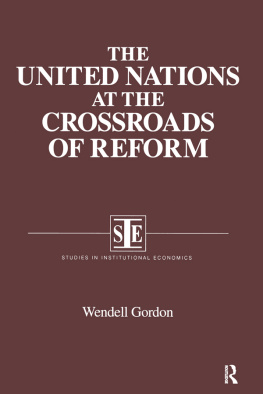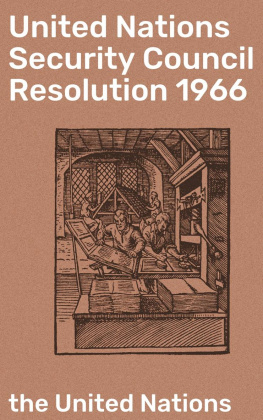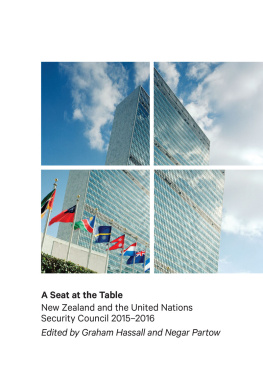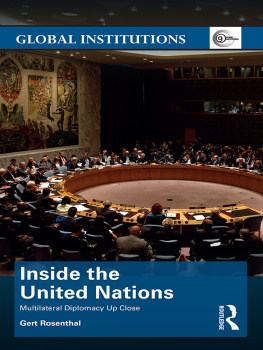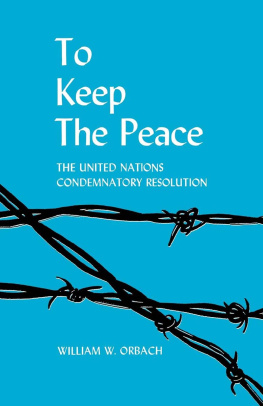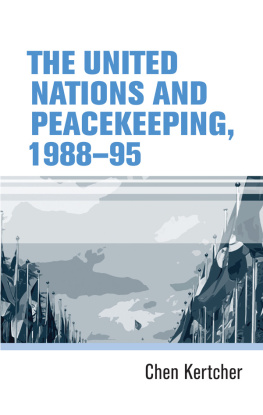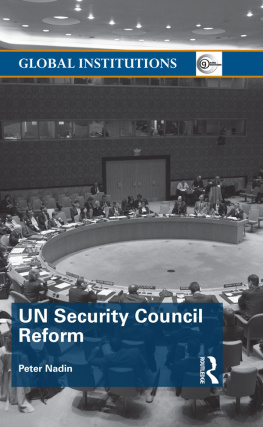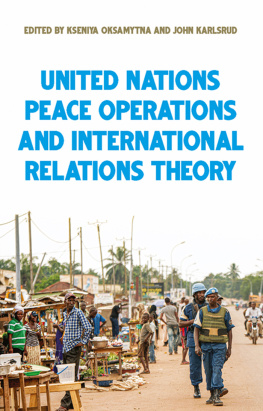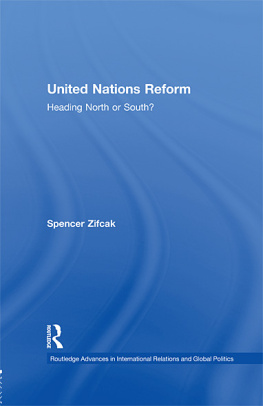THE
UNITED NATIONS
AT THE
CROSSROADS OF REFORM
STUDIES IN INSTITUTIONAL ECONOMICS
GARDINER C. MEANS
INSTITUTIONALIST AND POST KEYNESIAN
Warren J. Samuels and Slant G. Medema
THE HETERODOX ECONOMICS OF GARDINER C. MEANS
A COLLECTION
Frederic S. Lee and Warren J. Samuels, editors
UNDERGROUND ECONOMICS
A DECADE OF INSTITUTIONALIST DISSENT
William M. Dugger
THE STRATIFIIED STATE
RADICAL INSTITUTIONAUST THEORIES OF PARTICIPATION AND DUALITY
William M. Dugger and William T. Waller. Jr., editors
A VEBLEN TREASURY
FROM LEISURE CLASS TO WAR. PRICE. AND CAPITALISM
Rick Tilman, editor
ACTIVIST UNIONISM
THE INSTITUTIONAL ECONOMICS OF SOLOMON BARKIN
Donald R Stabile
BEYOND DISSENT
ESSAYS IN INSTITUTIONAL ECONOMICS
Philip A. Klein
THE UNITED NATIONS AT THE CROSSROADS OF REFORM
Wendell Gordon
A MONETARY THEORY OF EMPLOYMENT
Gardiner C. Means
Warren J. Samuels and Frrderie S. Lee, editon
THE
UNITED NATIONS
AT THE
CROSSROADS OF REFORM
Wendell Gordon
First published 1994 by M.E. Sharpe
Published 2015 by Routledge
2 Park Square, Milton Park, Abingdon, Oxon OX14 4RN
711 Third Avenue, New York, NY 10017
Routledge is an imprint of the Taylor & Francis Group, an informa business
Copyright Taylor & Francis. All rights reserved.
No part of this book may be reprinted or reproduced or utilised in any form or by any electronic, mechanical, or other means, now known or hereafter invented, including photocopying and recording, or in any information storage or retrieval system, without permission in writing from the publishers.
Notices
No responsibility is assumed by the publisher for any injury and/or damage to persons or property as a matter of products liability, negligence or otherwise, or from any use of operation of any methods, products, instructions or ideas contained in the material herein.
Practitioners and researchers must always rely on their own experience and knowledge in evaluating and using any information, methods, compounds, or experiments described herein. In using such information or methods they should be mindful of their own safety and the safety of others, including parties for whom they have a professional responsibility.
Product or corporate names may be trademarks or registered trademarks, and are used only for identification and explanation without intent to infringe.
Library of Congress Cataloging-in-Publication Data
Gordon, Wendell Chaffee, 1916
The United Nations at the crossroads of reform / by
Wendell Gordon.
p. cm. (Studies in institutional economics)
Includes bibliographical references and index.
ISBN 1-56324-400-4. ISBN 1-56324-401-2
1. United Nations. 2. International cooperation.
3. International relations. I. Title. II. Series.
JX1977.G676 1994
341.23dc20 94-19451
CIP
ISBN: 978-1-563-24401-8 (pbk)
ISBN: 978-1-563-24400-1 (hbk)
With great appreciation
to
an extraordinarily decent man
CLYDE EAGLETON
for many years
Professor of Government
New York University
Proponent of an effective
United Nations
Table of Contents
About the Author
The argument used in this work is in the framework of the institutionalism of Thorstein Veblen, John Dewey, John Kenneth Galbraith, Gunnar Myrdal, John R. Commons, J. Fagg Foster, Clarence Ayres, Allan Gruchy, Marc Tool, and Warren Samuels, no one of whom will entirely approve of the special slant of this writer. Involved is understanding the process of change: the nature of the process by which knowledge (particularly technical knowledge) is accumulated, impacts on institutions such as the United Nations, and calls for change in the workings (institutionalized behavior norms) of those institutions, and of all people.
I wish to acknowledge a special debt to Warren Samuels, the editor of the M.E. Sharpe, Inc., Studies in Institutional Economics series.
I am greatly indebted to Carolyn Ayers and Pat Wheeler for patiently typing and retyping the manuscript and to Jill Mason and Christine Florie for their most constructive contribution to the editing.
And I must express thanks to James R. Roach of the Department of Government at the University of Texas for critical and intelligent comments about the manuscript, comments which stimulated my efforts. I also have a similar debt to Richard D. Bartel, the editor at M.E. Sharpe, Inc., for critical but constructive comments.
Time will tell if the resulting manuscript is passable and worthwhile.
Wendell Gordon
July 1994
THE
UNITED NATIONS
AT THE
CROSSROADS OF REFORM
The Setting
The United Nations was established to maintain international peace and security. It was also to achieve international co-operation in solving international problems of an economic, social, cultural or humanitarian character, and in promoting and encouraging respect for human rights and for fundamental freedoms for all without distinction as to race, sex, language, or religion. Yet the nations of the world who charged the UN with these great missions never permitted it to acquire the resources it needed to fulfill them.
Thus, the UN is generally condemned as being incapable of carrying out its missions. In its efforts to prevent war and counteract aggressive invasions it is viewed as generally botching the job. This seems to be the case in the United States, where the presidency frequently deprecates the UN, both political parties in Congress welcome the chance to withhold funds from the UN, and condemnation of the UN is frequently heard from the general population. This attitude notwithstanding, it was the United States that was most influential at the San Francisco conference in 1945 in determining the precise role and powers of the UN. The organization did not create itself. It was created by the victors of World War II, meaning most particularly the United States, and was the result of their vision of an organization that could oversee the postwar world.
The authors of the charter were aware that it might have flaws, it might need revision. Consequently, they provided in Article 109 of the charter for A General Conference of the Members of the United Nations for the purpose of reviewing the present charter. Moreover, they were sufficiently aware of the likely need for general change in the structure and functions of the UN that they further provided for the necessity of having such a conference. In paragraph 3 of Article 109 it was stated that: If such a conference has not been held before the tenth annual session of the General Assembly following the coming into force of the present Charter, the proposal to call such a conference shall be placed on the agenda of that session of the General Assembly.
Inconsistently, despite the criticism of the UN that has been common, no such conference has been called. Yet it is surely most important that there be serious and general discussion in a prestigious meeting of the nations of the world of change in the structure and functions of the United Nations.

